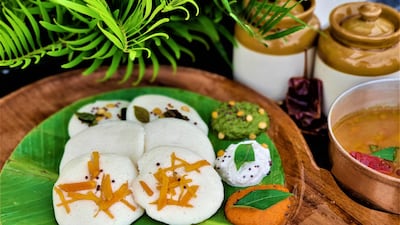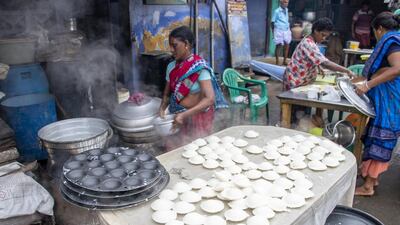Things have come full circle for the humble idli. The savoury and nutritious rice cake is something of a staple at breakfast, lunch and dinner tables in South India. Nutritional content aside, it has served as a means of livelihood for decades leading up to the outbreak of Covid-19, as well as in the midst of the pandemic.
This is best evidenced in the wholesale Idli Market at Karungalpalayam in Erode district in Tamil Nadu, where hundreds of self-made women entrepreneurs work tirelessly through the day to produce thousands of idlis.
These are sold to hungry souls at almost throwaway prices – two plain idlis cost 3.50 Indian rupees (about 18 fils), while for the princely sum of Rs6.50, one gets delicious and filling accompaniments such as sambhar and tangy coconut chutney, onion-based kaara chutney and even spicy fish curry.
The market came into existence 40 years ago, when the women left the kitchens to help men who had lost their jobs owing to the closure of traditionally woven cotton cloth factories, as synthetic, machine-made clothes became all the rage.
It was then that the age-old art of making idlis came in handy.
How to make idli
The dish is made by steaming a lightly salted batter of fermented and de-husked black lentils and polished parboiled rice, which gives it a distinct taste best comparable to sourdough bread. The batter is worked into special perforated greased moulds in a tray and steamed for up to 10 minutes so it becomes light and fluffy.
Spices, such as fenugreek seeds, mustard seeds, chilli peppers, cumin, coriander and ginger, can be added to impart a subtle savoury flavour. Idli can also be made with semolina (for a variant called rava idli), while sweet versions of the stuff add in sugar. Idlis can also be deep-fried.
The presentation of an idli can be as impressive as its contents. Placed on a banana leaf or a large serving plate, the flattened white orb comes with a fragrant array of colourful chutneys curled around it.
Healthy idlis are all the rage
“I grew up watching my mother cook them for breakfast every day,” says Shriluxmi Thevar, a big name in the idli industry. “You don’t have to be a multimillionaire to start an idli-making business. I started with a small investment, and I am happy that other women in the family also followed suit.”
Women such as Thevar, Meena Iyer and countless others run idli businesses in Tamil Nadu – ranging from street carts and stalls to makeshift cafes – with the men in the family assisting them by getting the necessary groceries and looking after deliveries.
Pre-pandemic, the idlis were supplied in bulk for marriages and other family functions, while in the current climate, a number of hospitals rely on the produce of the Idli Market to feed their patients.
A soft puff of rice and light spice, idlis boast high nutritional value and contain no saturated fats or cholesterol, with only 39 calories per 30-gram piece and 40 kcal of energy per serving. Many doctors recommend the dish as it is easy on the stomach.
Hospitals aside, the women sell the subsidised cakes to non-profits and other organisations that buy idli packets to feed the needy and people with limited access due to movement restrictions in India.
“When we buy from these shops, we get idlis of very good quality, at reasonable rates and on time,” says one happy customer, who places bulk orders regularly.
Idli restaurants in the UAE
The UAE, too, has a number of restaurants that serve a mean idli. In Abu Dhabi, check out Sangeetha Vegetarian Restaurant, Indian by Nature and Aryaas Express, while in Dubai, Vasanta Bhavan Vegetarian Restaurant, MTR and Venus Restaurant come highly recommended.


